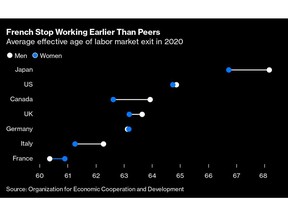Article content
(Bloomberg) — Emmanuel Macron’s government presented a plan to gradually raise France’s minimum retirement age to 64 by 2030 from 62, defying labor unions that have pledged to resist the change with strikes and protests.
Emmanuel Macron’s government presented a plan to gradually raise France’s minimum retirement age to 64 by 2030 from 62, defying labor unions that have pledged to resist the change with strikes and protests.

(Bloomberg) — Emmanuel Macron’s government presented a plan to gradually raise France’s minimum retirement age to 64 by 2030 from 62, defying labor unions that have pledged to resist the change with strikes and protests.
Story continues below
Making the French work longer is essential to boost relatively low employment rates among seniors and avoid persistent deficits in a system funded by worker contributions, the government has said. Labor organizations say it will unfairly penalize the low-skilled and least wealthy who began working early in life.
“I’m aware that changing our pension system raises questions and fears,” Prime Minister Elisabeth Borne told a news conference in Paris. “Today, we are presenting a plan of balance for our retirement system, a plan of fairness, a plan that brings social progress.”
Unions will meet later on Tuesday to decide how to respond to the announcement. The government intends to present a final version of the pension bill in a cabinet meeting on Jan. 23, before parliament starts reviewing the legislation from February.
Story continues below
The showdown around what French officials have dubbed “the mother of all reforms” is set to be a defining moment in Macron’s second five-year term as French leader.
If the 45-year-old forges ahead, he’ll likely face the kind of paralyzing upheaval that accompanied — and sometimes defeated — his predecessors’ attempts to alter laws affecting labor and retirement. If he backs down, it would undermine his decade-long drive to drag France through a pro-business transformation.
Read more: Macron Stakes Economic Legacy on Pension Reform Fight
Macron already withdrew a different proposal for pension reform in 2020 after months of demonstrations and strikes. At the time, he cited the Covid pandemic.
The gamble in 2023 also comes at a difficult juncture for the French economy as it wrestles with soaring power prices, and record inflation weighs on households and businesses.
Story continues below
Public finances are strained after massive spending during the pandemic and the energy crisis. Without changes to the retirement system, it alone is set to record an annual deficit of as much as 0.8% of annual economic output during the next 10 years, according to France’s Pensions Advisory Council. That will come at a time when the government is also seeking to devote more funds to investment in industry and the green transition.
In an effort to build consensus, Borne dropped the proposal Macron initially touted during his election campaign to raise the minimum retirement age to 65. To meet the objective of financial balance, she said the government will instead accelerate the implementation of a previous overhaul that gradually increases the minimum number of years of contributions to 43. The age at which people can retire with a guarantee of a full pension will not be changed from 67.
Story continues below
Those concessions respond to some of the demands of the conservative Republicains party, which has said it could back the pension bill if there are guarantees on minimum retirement incomes and the age cut-offs are not raised too far or too fast. Securing that backing would give Macron a large enough majority in parliament to avoid using the controversial article in the constitution that allows bills to pass without a vote.
Still, that is unlikely to appease the protests as a large majority of French people oppose the plan and unions have reiterated their opposition to even a small increase in the minimum age. According to a Jan. 4 survey of 1,005 people by pollster Elabe for BFM TV, 47% want the minimum age to remain at 62 and another 25% say it should even be lowered. Some members of leftist parties already said they would join demonstrations on Jan. 21.
Story continues below
Falling Approval
Labor unions argue there are other options to re-balance the system, including encouraging or obliging French companies to keep on older workers, or reining in Macron’s corporate tax cuts to fund the pension system.
The reform is a very personal challenge for Macron, who is looking to build his legacy as he cannot run for a third term in 2027 and has always been keen on leaving his mark on the French economy.
His approval rating has fallen to the lowest level since March 2020, before the Covid pandemic swept through France, according to a survey by pollster Ifop for Paris Match magazine and Sud Radio published on Tuesday. Of 1,010 adults interviewed online on Jan. 5-6, 36% said they backed his record as president, down 2 points on the previous month. The poll also showed that three-fifths of participants don’t see him as capable of reforming the country.
(Corrects day of union meeting in fourth paragraph to Tuesday from Thursday)
Story continues below